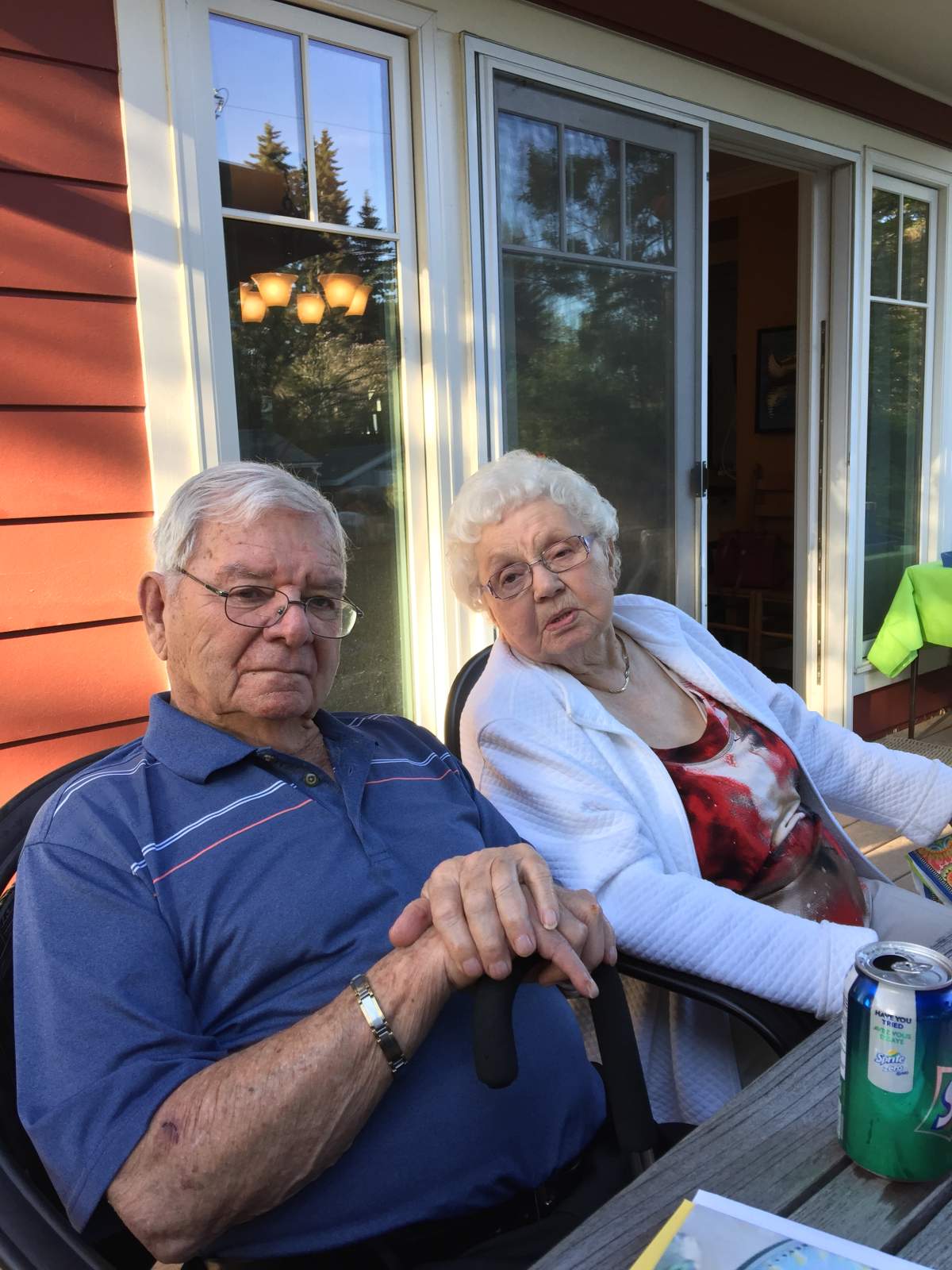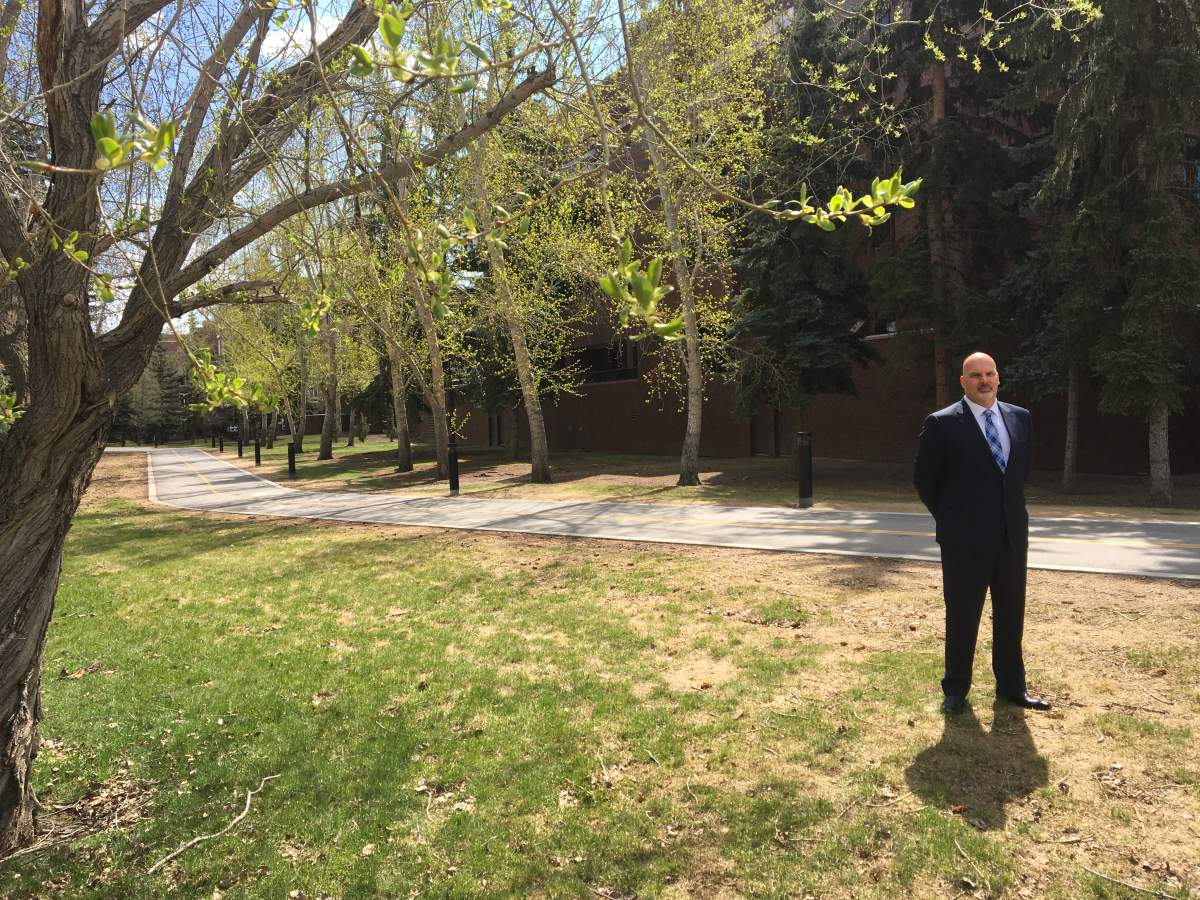Michael Sondermann isn’t staying quiet about an ordeal he says his family endured in the midst of the COVID-19 pandemic. His parents, Margarete and Wolfgang Sondermann, live in Millrise Seniors Village in Calgary’s southeast.

“You don’t have a lot of opportunities to do stuff for your parents, and this is one of those opportunities and I’m not going to let it go,” Sondermann said.
In late April, Sondermann said he was sick with worry, and his parents were getting concerned after COVID-19 started to spread inside the long-term care home and deaths started to mount.
Wolfgang and Margarete Sondermann.”I phoned the public health advocate, and about an hour after, they called me back and said they would go in and take a look,” Sondermann recalled.
Alberta health authorities took over the home because of staffing challenges on May 4. In a statement to Global News, Millrise management admitted it was tough in those early days with staff having to be quarantined but appreciated the added support that put them in a much better position to care for residents.
Millrise didn’t address questions regarding the Sondermanns.
“There comes a resignation: your parents are getting older,” Sondermann said. “I’ve wrapped my head around the fact the time is coming and I’m OK with that. I was OK with that until I thought the cause of their demise would be where they live.”
He’s writing a letter to Premier Jason Kenney in hopes of compelling provincial health authorities to make changes. He’s asking for more transparency and accountability.
“If you had a blue-ribbon panel to figure out how to look after our elderly, nobody would pick the system we have today,” Sondermann said.
“Nobody has the guts or political will to change this.
“People will very quickly stop caring about Margarete and Wolfgang Sondermann and everyone else except for me,” Sondermann said. “That’s the only thing that’s going to change is if we all push for change.”
Continuing care homes are inspected by Alberta Health to ensure accommodation standards are met. Inspectors look at building cleanliness and maintenance. Reports are made public. But Alberta Health Services is responsible for audits to ensure compliance on health standards. Those results aren’t disclosed, but provincial health officials say plans are in place to change that later this year.
The NDP opposition is calling for something much more in-depth. Seniors critic Lori Sigurdson said the province isn’t doing enough.

Get weekly health news
“Family members should be able to count on facilities to care for their loved ones, and that’s completely failed to happen here in Alberta and it’s important we have a public inquiry,” Sigurdson said.
When Global News asked Kenney for comment, his office deferred to the health ministry. Despite repeated requests and with several weeks’ notice, Global News was told Health Minister Tyler Shandro wasn’t available for an interview.
Instead, Alberta Health spokesperson Tom McMillan said the government will review continuing care legislation on compliance and monitoring.
“Overall, our system has done a good job of protecting residents relative to other provinces and countries,” McMillan said.
Collin May had to take a legal route to get justice for his family. His father Ronald died while in care at a different facility in 2017.
“Institutional betrayal is a good word for what happened to us,” May said.
He recommended families engage the Protection for Persons in Care Act, a law designed to allow families to report allegations of abuse and wrongdoing in care homes.
“All the complaints and interviews and letters, whether it was a health advocate or the ombudsmen, I am over 30 and that’s a stunning number, and the public shouldn’t have to be in the position where it has to engage in that sort of effort because it’s tiring and most people can’t do it,” May said.
“We need to have standards, they need to be enforced,” May said. He said he also is asking for “something that allows patients and families immediate access to assistance or a robust health advocate with ability to investigate.”
“If we don’t take this opportunity now, I’m afraid we never will.”
Others say the responsibility for change goes beyond individual provinces. A petition is calling for a national strategy.

Susan Kennard signed that petition. Her parents, Don and Stella Kennard, lived in long-term care, and Kennard said the experience was awful.
“I’m still angry the indignity my parents faced being decanted from facility to facility, and no amount of money insulates you from these broken systems,” Kennard said.
“COVID took a broken system and shattered it.”
Don and Stella Kennard.Kennard’s mom died in 2018, and she lost her dad in 2015. But she continues to advocate for all the other families.
“There’s so much horrible language and dehumanization of vulnerable seniors and no one was listening, and I started a blog and thousands responded saying this is their exact same story,” Kennard said.
Seniors care falls outside the scope of the Canada Health Act, which means provinces separately provide oversight and funding, but there’s a call for national standards to ensure priorities for seniors.
Hassan Yussuff, president of the Canadian Labour Congress, said now is the time for action. The organization has compiled a list of 21 recommendations.
“Governments have continued to reduce money they invested in long-term care and in addition they privatized services, and what private operators have been getting away with is criminal,” Yussuff said. “What we have seen in this pandemic is inadequate, and more importantly, we need governments to take responsibility to enforce standards we create.”
Alberta’s auditor general is planning to review the response to the pandemic, with a strong focus on seniors.

“Obviously this has been a significant issue not only in Alberta but across Canada. It’s something we want to make sure that we do spend our resources in the right area that are going to provide value to make the improvements that are needed, if we find any opportunities to make those recommendations,” Doug Wylie said.
The hope is to release findings later in 2020. But Wylie said there are still outstanding recommendations on seniors’ care dating back as far as 2005 relating to staffing levels.
Friends of Medicare executive director Sandra Azocar she is lobbying for better wages for workers said staff-to-patient ratios need to be legislated.
“If you look at the makeup of our seniors’ care staffing, it’s marginalized workers that make up the brunt of it, and because of the low-wage strategies that have been put in in the name of profit, we see people underpaid and overworked and undervalued,” Azocar said.
“Nothing has been done.”
Studies have shown the majority of workers are stressed with the workload and navigating multiple jobs at different locations.
“When systems are under stress, that’s when we can see the cracks, and our seniors’ care system is definitely showing the cracks,” Azocar said. “It has shone a light on shortfalls, and we need to fix it.”










Comments
Want to discuss? Please read our Commenting Policy first.